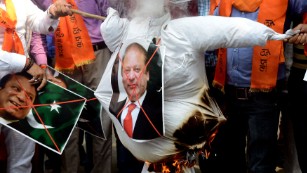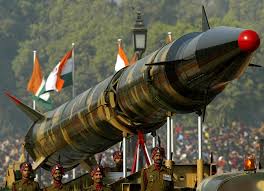Kashmir: Why is India's Modi going on the offensive?
India's reported "surgical strike" across the border into Pakistani-controlled Kashmir on Wednesdaybrings India-Pakistan relations to their lowest point in almost a decade.
But it will be celebrated not just by the Hindu nationalist supporters of Prime Minister Narendra Modi, but also by many other Indians who believe that their country has remained passive for too long in the face of repeated terror attacks by groups assisted and sheltered by the Pakistan army's powerful intelligence services.

Could India and Pakistan go to war?
In truth, the strike itself does not represent a radical new policy. India conducted local cross-border raids through the 1990s and 2000s, usually as reprisals for particular attacks. But this high-altitude, tit-for-tat war on the Line of Control, which divides Indian and Pakistani-controlled parts of Kashmir, was largely unknown to the Indian public, who grew frustrated at their government's apparent inaction.
India's decision to go public in dramatic fashion is therefore a break with the past.
Why did Modi take this step?
Domestic politics is part of the answer. After a terrorist attack earlier this month that killed 18 soldiers in Kashmir, a senior leader of Modi's party, the Bharatiya Janata Party, demanded severe retaliation: "Pakistan is a terrorist state," tweeted Modi's home minister, "and it should be identified and isolated as such."
Retired generals, diplomats and news anchors demanded that Pakistan be given a "bloody nose."
This intense public pressure likely influenced Modi's decision both to strike and to go public. He will reap political rewards for doing so. Even the opposition Congress Party, which usually attacks nearly everything the government does, expressed its approval of "actions to protect country's security."
Modi's supporters portray the raid as yet another example of his willingness to assert Indian power across the region, from giving attack helicopters to Afghanistan to sending troops across the border into Myanmar to attack insurgent camps.
Beyond politics, Modi's government is eager to show that it won't be business as usual. Modi tried to cooperate with Pakistan after an earlier terrorist attack on an airbase in January, but Pakistan made no effort to curb the group responsible and New Delhi grew disillusioned.
This is a way of signaling that New Delhi's patience has run out, and that India might escalate further next time.
At the same time, it should be remembered that this was a relatively modest operation. It was restricted to disputed territory, allowing India to claim it remained within what it considers to be its own soil. It also deliberately focused on militants, rather than Pakistani troops, which would have been more provocative.
News Courtesy: www.cnn.com











